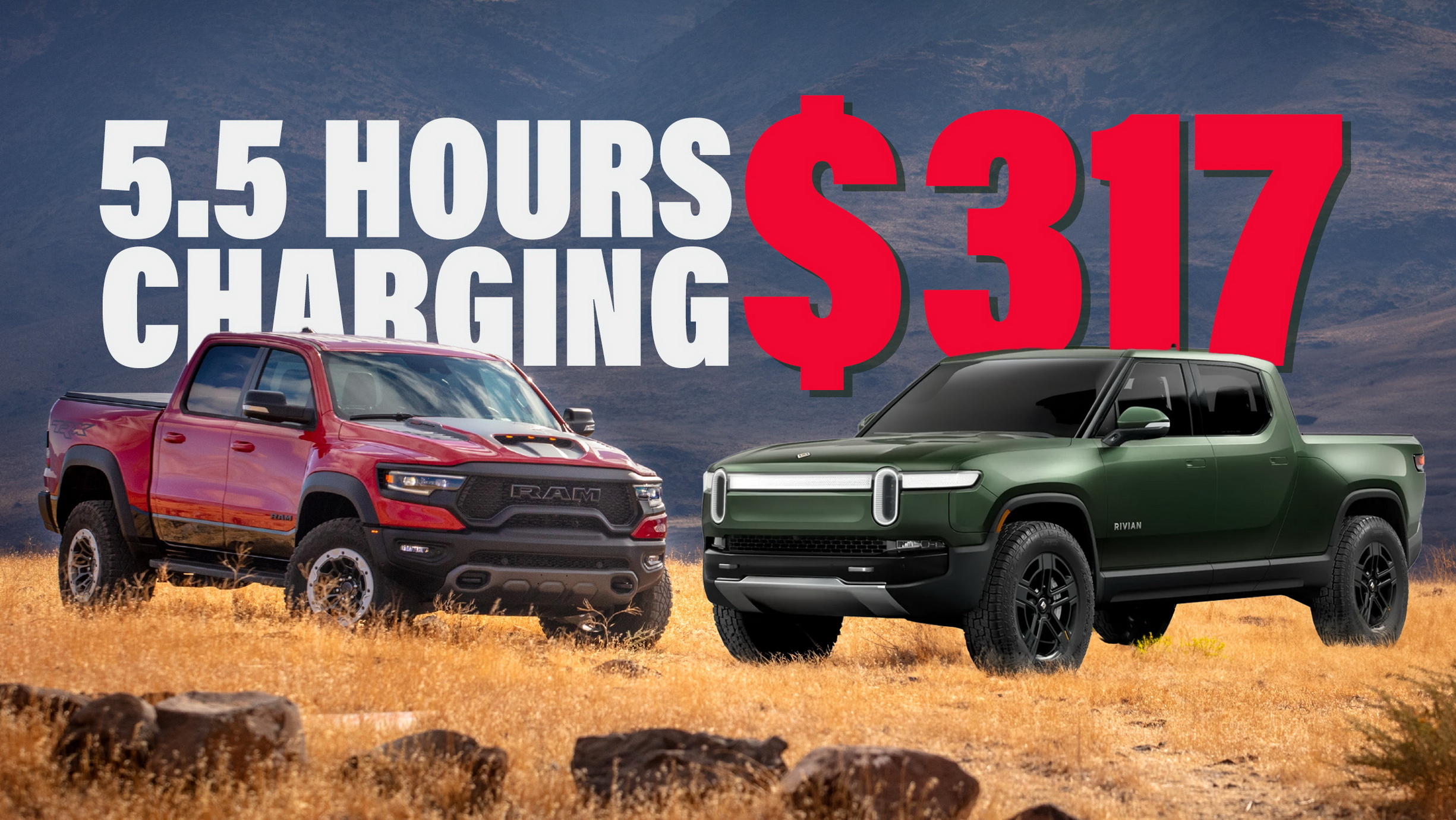The all-electric pickup ended up parked for over five hours at various chargers and cost almost $320 to go 1,100 miles
The Rivian R1T is a desirable pickup in the eyes of many. Fans seem to love its styling, its capability, and its eco-friendly nature. That last feature might just be a bit of a misnomer though as a recent test suggests. In a road trip from Michigan to Florida the R1T cost as much, or even more to fuel than a Ram TRX and required over five hours of charging in the process.
This test happened at the hands of Car and Driver and with its very own long-term R1T test vehicle. The folks there decided to drive from their headquarters at 1585 Eisenhower Pl, Ann Arbor, MI to Daytona Speedway for the opening race of the IMSA season. It was a noble goal with a bit of fun baked in they must have thought when they set out on the nearly 1,100-mile trip (roughly 1,770 km).
Sadly, the reality is that road trips in an EV that can’t access the Tesla Supercharger network still aren’t smooth sailing. Rivian’s navigation system indicated to the team that they’d need to stop 10 times to charge and that the trip would take 24 hours and 31 minutes. According to Google Maps, the normal non-EV estimate is about 16 and a half hours.
Throughout the journey, the team stopped at charging stations from Rivian, EVgo, Electrify America, EV Connect, and ChargePoint. Unsurprisingly, the team didn’t experience a 100% success rate at every charger. In fact, after having to switch charging stations because one was broken, one Car and Driver staffer remarked “This was a cool idea, but I’d like to fly down next year.”
In total, the crew spent in excess of five and a half hours charging the vehicle and $317 in charging fees. Those figures could’ve been better in optimal situations though. For example, the crew could’ve stretched charging sessions to be further apart but it would’ve risked showing up to a broken charger without enough range to reach another one. In addition, it could’ve potentially found cheaper chargers along the route but that would’ve taken more time.
That amount of money spent on a trip of that length is far from what most people expect when they think of an electric vehicle. In fact, it’s less efficient than if the staff had driven a Ram 1500 TRX between the two points.
According to fueleconomy.gov‘s trip calculator, the Ram would’ve used $315.53 worth of fuel (provided 1% of in-city driving) during the trip, or even less at about $265.95 according to the AAA gas cost calculator. If we consider Car and Driver’s own average fuel economy of 11 mpg during their long-term test of the 2022 Ram TRX, along with a current average fuel price of $3.475 in Detroit, the trip would have cost around $347, $30 more than with the electric vehicle. Either way, that doesn’t even begin to consider how much faster the Ram would’ve been able to refuel. Saved time equals saved money right?

 www.carscoops.com
www.carscoops.com
The Rivian R1T is a desirable pickup in the eyes of many. Fans seem to love its styling, its capability, and its eco-friendly nature. That last feature might just be a bit of a misnomer though as a recent test suggests. In a road trip from Michigan to Florida the R1T cost as much, or even more to fuel than a Ram TRX and required over five hours of charging in the process.
This test happened at the hands of Car and Driver and with its very own long-term R1T test vehicle. The folks there decided to drive from their headquarters at 1585 Eisenhower Pl, Ann Arbor, MI to Daytona Speedway for the opening race of the IMSA season. It was a noble goal with a bit of fun baked in they must have thought when they set out on the nearly 1,100-mile trip (roughly 1,770 km).
Sadly, the reality is that road trips in an EV that can’t access the Tesla Supercharger network still aren’t smooth sailing. Rivian’s navigation system indicated to the team that they’d need to stop 10 times to charge and that the trip would take 24 hours and 31 minutes. According to Google Maps, the normal non-EV estimate is about 16 and a half hours.
Throughout the journey, the team stopped at charging stations from Rivian, EVgo, Electrify America, EV Connect, and ChargePoint. Unsurprisingly, the team didn’t experience a 100% success rate at every charger. In fact, after having to switch charging stations because one was broken, one Car and Driver staffer remarked “This was a cool idea, but I’d like to fly down next year.”
In total, the crew spent in excess of five and a half hours charging the vehicle and $317 in charging fees. Those figures could’ve been better in optimal situations though. For example, the crew could’ve stretched charging sessions to be further apart but it would’ve risked showing up to a broken charger without enough range to reach another one. In addition, it could’ve potentially found cheaper chargers along the route but that would’ve taken more time.
That amount of money spent on a trip of that length is far from what most people expect when they think of an electric vehicle. In fact, it’s less efficient than if the staff had driven a Ram 1500 TRX between the two points.
According to fueleconomy.gov‘s trip calculator, the Ram would’ve used $315.53 worth of fuel (provided 1% of in-city driving) during the trip, or even less at about $265.95 according to the AAA gas cost calculator. If we consider Car and Driver’s own average fuel economy of 11 mpg during their long-term test of the 2022 Ram TRX, along with a current average fuel price of $3.475 in Detroit, the trip would have cost around $347, $30 more than with the electric vehicle. Either way, that doesn’t even begin to consider how much faster the Ram would’ve been able to refuel. Saved time equals saved money right?

Rivian R1T Proves As Efficient As A Ram TRX In 1,100 Mile Test | Carscoops
The all-electric pickup ended up parked for over five hours at various chargers and cost almost $320 to go 1,100 miles

